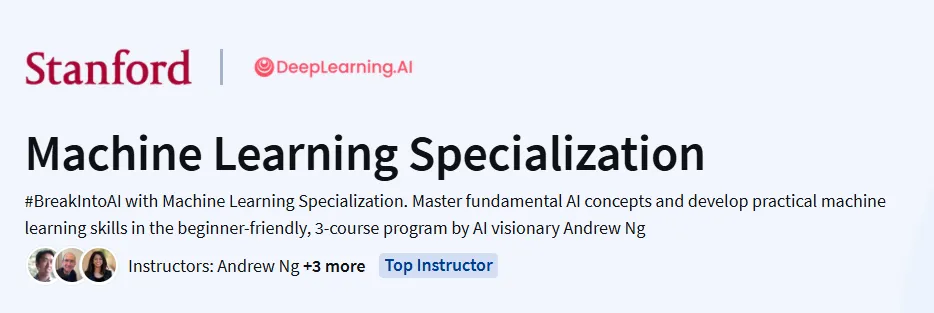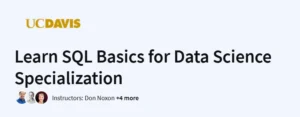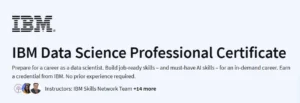What you will learn in Machine Learning Specialization Course
- Understand the basics of supervised and unsupervised learning.
- Learn about key machine learning models, including regression, classification, and clustering.
- Gain hands-on experience with Python and machine learning libraries such as Scikit-learn and TensorFlow.
- Explore techniques for model evaluation, hyperparameter tuning, and bias mitigation.
- Work on real-world datasets to apply machine learning techniques in practical scenarios.
- Learn about neural networks and deep learning fundamentals.
Program Overview
Introduction to Machine Learning
⏱️ 4-6 weeks
- Understand what machine learning is and its real-world applications.
- Explore different types of learning: supervised, unsupervised, and reinforcement learning.
- Get an introduction to Python and its libraries for machine learning.
Data Preprocessing and Feature Engineering
⏱️ 6-8 weeks
- Learn techniques to clean and prepare data for machine learning models.
- Understand feature selection, transformation, and engineering.
- Handle missing data, categorical variables, and outliers effectively.
Supervised Learning: Regression and Classification
⏱️8-12 weeks
- Learn about linear and logistic regression, decision trees, and support vector machines.
- Train and evaluate classification models for various datasets.
- Understand model metrics such as accuracy, precision, recall, and F1-score.
Unsupervised Learning: Clustering and Dimensionality Reduction
⏱️10-12 weeks
- Explore clustering algorithms like K-means and hierarchical clustering.
- Learn dimensionality reduction techniques such as PCA and t-SNE.
- Understand how to visualize high-dimensional data for better insights.
Neural Networks and Deep Learning
⏱️ 12-15 weeks
- Introduction to deep learning fundamentals and neural network architectures.
- Learn about activation functions, optimization techniques, and backpropagation.
- Build and train simple neural networks using TensorFlow and Keras.
Machine Learning Capstone Project
⏱️ 12-15 weeks
- Apply learned concepts to a real-world machine learning project.
- Clean, process, and analyze a dataset to build an ML model.
- Present findings and insights through visualizations and reports.
Get certificate
Job Outlook
- The demand for machine learning engineers and data scientists is projected to grow by 22% by 2030 (U.S. Bureau of Labor Statistics).
- Industries such as healthcare, finance, e-commerce, and technology actively seek ML professionals.
- Entry-level salaries for machine learning engineers range from $80K – $110K, with experienced professionals earning $120K+.
- Employers seek candidates proficient in Python, TensorFlow, Scikit-learn, and cloud computing.
- This course serves as a stepping stone for careers in AI, data science, and software engineering.
Specification: Machine Learning Specialization
|
FAQs
- A beginner-friendly program from DeepLearning.AI & Stanford Online, taught by Andrew Ng—a leading figure in AI education.
- A modern update of his classic 2012 ML course, now structured into three comprehensive courses that emphasize Python-based practice over Octave/Matlab.
- Learners build key ML models—regression, classification, neural networks, decision trees, and tree ensembles—using tools like NumPy, scikit-learn, and TensorFlow. Plus, you explore unsupervised learning, clustering, anomaly detection, recommender systems, and reinforcement learning.
- Yes—while labeled beginner-friendly, the course still assumes familiarity with basic Python programming and high-school level math.
- Many Reddit users note that while it’s accessible, sections—especially on advanced algorithms—can be challenging if you’re lacking calculus, linear algebra, or programming fluency.
- The specialization is broken into three core courses:
- Supervised Machine Learning—covers regression, classification, neural networks.
- Advanced Learning Algorithms—deepens knowledge with regularization, optimization, multilayer networks via TensorFlow.
- Unsupervised Learning & Reinforcement Learning—includes clustering, PCA, recommendation systems, and RL intro.
- Internalized through hands-on Python labs with Jupyter notebooks, provided directly in-browser.
- Reasons to take it:
- Taught by Andrew Ng with clear explanations and hands-on practice. Students typically praise the approachable teaching style.
- Covers essential ML foundations—useful for starting careers or understanding AI workflows.





